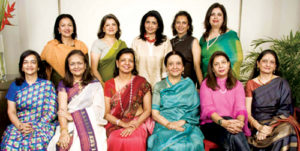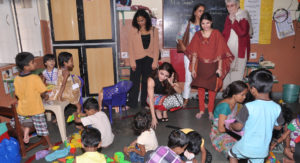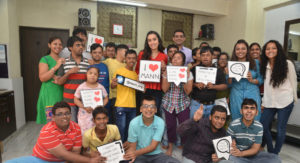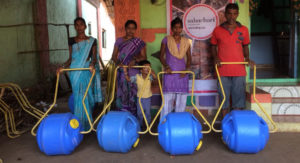Ten-year old Sahachari Foundation has thus far helped over 20 charitable organisations. Going forward, the Foundation’s powerful team of 18 women aims to support more NGOs across the length and breadth of the country and even plans on going international.

Braving the monsoon in Mumbai is not for the faint hearted. When I landed mid-week, it was raining the proverbial cats, dogs and other members of the animal kingdom and this meant travelling to Malabar Hill was a harrowing task. But when I entered Brinda Khatau’s residence, I was transported to another world. The electrifying ambience and the warmth that emanated from the group of women seated at the table energised me, mind and body. The next two hours were the most interesting where the conversation was as extensive as the brunch menu. As I enjoyed the poha, dhokla, chaat, corn baskets and sinful desserts, the six members of Sahachari Foundation took me on a 10-year journey of what the team has achieved and what its ambition is for the future.
To new beginnings
“Each one of us believed that we have been blessed with an abundance of everything in life and it was time to give back to the society,” recalls Gauri Pohoomul. These women from varied backgrounds and experiences got together to work towards the common goal of supporting causes that were dear to them.
Some were proficient in setting up exhibitions while others were more comfortable crunching numbers. There was a collective decision to use each one’s skill to raise funds and give 100 per cent back to the charity. The Foundation began by supporting three or four charities, and so far, it has supported almost 20 NGOs, some of them on a regular basis. “We take up large and continuous programmes and commit to them year-on-year,” shares Gauri.
While larger NGOs get aid from corporates, there are many smaller, deserving organisations that do not know how to source funds. Sahachari Foundation reaches out to such NGOs to further their impact. The NGOs address various causes including health care, women’s empowerment, education of children from marginalised backgrounds, care of the physically and mentally challenged, animal welfare and more.

More than just a cheque
“Sahachari has become an integral part of our lives. Despite our individual commitments personally and professionally, we spend a lot of time on all our projects,” shares Minakshi Bajaj. The process involves one member identifying a deserving cause, and suggesting an NGO with a good track record that executes the cause. This member has a more active role to play with research on the same. Someone from the team visits the NGO on a regular basis to monitor the work done and track the funds, until the project reaches completion.
While the team aims to make a difference, it goes beyond signing a cheque and moving on. The sentiment across the table was one of deep emotion when members spoke about the kind of impact their Foundation has made. They narrated a story of a sex worker, Namita (name changed), (of Apne Aap that Sahachari Foundation supports) who was in the profession for 10 years. Her daughter was picked up from the streets and placed in an Apne Aap shelter, provided an education and is now married. Both her husband and she earn well and they have brought her mother out of prostitution, who has now become an outreach for Apne Aap. “This is most rewarding for us,” says Amruda Nair, echoing everyone’s feelings.
With every NGO that the team has worked with, due diligence is carried out, a review of three years’ balance sheets and the impact made by the NGO in the field of operation. The member also looks at the cost-effectiveness of the NGO and also finds out about the support structure and the kind of manpower at hand. The administrative cost of some organisations is very high. “We do not want to fund an organisation’s top-heavy administration cost,” admits Brinda Khatau.
The Foundation has three full time employees. The workload is shared by the members who also work with various agencies.
“Each one of us believed that we have been blessed with an abundance of everything in life and it was time to give back to the society,”
Where do the funds come from?
“The funds are raised through sponsorship support from the corporate world at various events and exhibitions,” says Brinda. While the actual number of events may differ each year, the team conducts a minimum of 3 exhibitions and five cultural events annually.
About Design One
A flagship of the Foundation, Design One exhibitions, provides a platform for upcoming designers to showcase their talents. Several of them have gone on to become big-name players,” share Brinda and Gauri. Design One’s committee members reiterate that the exhibitions are different from the ones that are conducted on a regular basis as there is a certain amount of curation, thanks largely to their personal involvement.
The Foundation receives over 1,200 applications per exhibition from across the country, of which between 100 and 150 are selected to participate. We have a few regulars who create something unique for us,” says Brinda. Nearly 50 per cent of participants at the exhibitions are new entrants.
The team also promotes India’s weaving traditions with serious earnest. Through Amazing Yards, it cuts out the middle-man and brings weavers directly in touch with buyers. Couture presentations by India’s noted fashion designers like Muzaffar Ali, Tarun Tahiliani, Abu Jani and Sandeep Khosla and Manish Malhotra have a huge draw. “There is such a novelty to the events we put up that they become a desired destination for people to come.”
While it organises events for fund raising, the team also supports art and culture. Sahachari Foundation has a collaborative association with the National Centre for Performing Arts (NCPA).

World-renowned table maestro Zakir Hussain does an annual show for the Foundation as do vocalist Shankar Mahadevan and eminent art historian, Dr. B.N. Goswamy.
Sahachari Foundation’s events are mostly in Mumbai with a few in Delhi. Soon, the team will reach out to the international market. In fact, in mid-October, an Indian-themed musical will be held at the Dubai Opera house.
Looking ahead, the aim is for the Foundation to showcase talent and generate funds in the international arena.
Not without the sponsors
“Without corporate support it is not possible to do anything as we do not charge much to our exhibitors,” says Smita Parekh. The whole idea is to give them an opportunity to showcase their products and reach a larger audience. When a corporate supports the Foundation, a lot of branding presence is given in all their communication – be it traditional advertising or on social media. The Foundation also offers them a complimentary stall at the exhibition. Exhibitions have a high footfall which gives the sponsor greater exposure. “Spread over two days, there are anywhere between 15,000 to 20,000 people who attend our exhibitions. So it is a branding opportunity,” says Smita.
“We believe that the ends must justify the means. If we are putting in a lot of work, the idea is to have surplus to donate,” shares Amruda Nair. “In the coming years, we see ourselves scaling our work and taking the organisation to even greater heights,” says Brinda. The team meets once a month and has a subcommittee for each project that monitors the cause they support, with a fair amount of scrutiny. As we end the meeting, the members are very clear about one thing: they are friends first who work together on projects that hold a greater meaning and purpose. And this camaraderie is plain for anyone in the room to feel.

A few charities supported by Sahachari Foundation:
Apne Aap Women’s Collective
An NGO engaged in grass-root level work to provide education and shelter for daughters of women in prostitution, in order to protect them from second generation sex work and give them a better life.
BSPCA
Bombay Society for the Prevention of Cruelty to Animals, including Bai Sakarbai Dinshaw Petit Hospital for Animals provides dedicated service to all types of sick and injured animals. The Bombay SPCA is effectively preventing cruelty to animals in Mumbai by employing inspectors, social workers and spreading education and awareness programmes.
Victoria Memorial School for the Blind
The Victoria Memorial School for the Blind is dedicated to the education and rehabilitation of the blind and visually impaired.
St. Jude India Childcare Centres
Provide palliative care and a clean environment for children recuperating following treatment for cancer.
Muktangan
An initiative of Paragon Charitable Trust, Muktangan is a pioneering educational programme that provides high-quality, affordable English-medium education to over 2000 economically-depressed children.
Aashray provides a home where senior citizens can live their lives in dignity.
Aangan helps over 20,000 girls from economically depressed backgrounds by giving them vocational training and livelihood opportunities.
Kherwadi provides vocational training to school drop-outs and equips them to improve the quality of their lives.
SOS Children’s Villages rears orphans in a family environment and provides them with education, medical facilities, vocational training and livelihood opportunities, to be integrated into mainstream.
Nanhi Kali educates the girl child from under-privileged communities.
Sakha Cabs: Challenging a traditional male bastion, the NGO runs an all-women’s taxi service which trains underprivileged women as chauffeurs.
Jaipur Foot project promoted by BMVSS: rehabilitates the disabled by providing artificial limbs (Jaipur Foot variations), calipers and other aids and appliances, free of charge.
Habitat for Humanity: for rural upliftment
ISKCON Food Relief Foundation: mid-day meals
Cochlear Implant surgeries that restore hearing to the hearing impaired.
Mann: for children with special needs
Jai Vakeel School: for the mentally challenged
Om Creations Trust: for solar project in new building
Welfare of Stray Dogs
Kalashala: music training programmes for students from underprivileged communities
Naam Foundation: relief in drought-stricken areas
Koregaon Education Society: part-funding the building of a school for tribal children
Eteach India, a portal that works towards English proficiency in the villages.